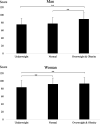The relationship between body dissatisfaction, lifestyle, and nutritional status among university students in Southern China
- PMID: 37777718
- PMCID: PMC10543264
- DOI: 10.1186/s12888-023-05215-8
The relationship between body dissatisfaction, lifestyle, and nutritional status among university students in Southern China
Abstract
Background: In recent years, obesity in early adulthood has become an urgent global public health concern. Body dissatisfaction may have adverse effects on lifestyle habits, leading to obesity. However, research on nutritional status and body dissatisfaction among Chinese young adults is still insufficient. Therefore, this study aimed to analyze the relationship between body dissatisfaction, dietary habits, physical activity, and nutritional status among university students. In addition, we explored the feasibility of improving university students' nutritional status by improving the levels of body dissatisfaction.
Methods: This study was conducted in Ganzhou City, Jiangxi Province, China, at a randomly selected university. All 1900 undergraduate students volunteered to participate and signed the consent form. Students were required to completed anthropometric measurements and three questionnaires, which included the Physical Activity Rating Scale-3 (PARS-3), Chinese version of the Dutch Dietary Behavior Questionnaire (C-DEBQ), and Body Dissatisfaction. Of these, 1714 students (age: 18-24 years; men: 933, women: 781) with complete and valid data were included.
Results: Higher obesity levels were observed in men compared to women (p<0.01). Meanwhile, body dissatisfaction was higher in women compared to men (p<0.01). Overeating and insufficient physical activity were more problematic in women compared to in men (p<0.01). Multiple regression analyses were conducted separately, with BMI and body dissatisfaction as the dependent variables. Body dissatisfaction (β=0.72, p<0.01), muscle mass (β=0.33, p<0.01), emotional eating score (β=0.05, p<0.01), sex (β=-0.05, p<0.05) and physical activity (β=-0.04, p<0.05) score were significant predictors of obesity. Furthermore, Muscle mass (β=0.61, p<0.01), sex (β=0.54, p<0.01), restrained eating score (β=0.25, p<0.01), physical activity score (β=-0.20, p<0.01) and emotional eating score (β=0.08, p<0.01) were significant predictors of body dissatisfaction.
Conclusion: The data presented in this study highlight the impact of university students' body dissatisfaction in China on physical activity deficiency and overeating, discovering that reducing body dissatisfaction has great potential for preventing obesity.
Keywords: Body dissatisfaction; China; Lifestyle; Nutritional status; University students.
© 2023. BioMed Central Ltd., part of Springer Nature.
Conflict of interest statement
The authors declare no competing interests.
Figures
Similar articles
-
Relationship between body dissatisfaction, insufficient physical activity, and disordered eating behaviors among university students in southern China.BMC Public Health. 2022 Nov 9;22(1):2054. doi: 10.1186/s12889-022-14515-9. BMC Public Health. 2022. PMID: 36352371 Free PMC article.
-
The effects of body dissatisfaction, sleep duration, and exercise habits on the mental health of university students in southern China during COVID-19.PLoS One. 2023 Oct 12;18(10):e0292896. doi: 10.1371/journal.pone.0292896. eCollection 2023. PLoS One. 2023. PMID: 37824511 Free PMC article.
-
Mediating role of exercise in the relationship between body dissatisfaction and overeating using structural equation modeling.BMC Public Health. 2025 Jan 7;25(1):76. doi: 10.1186/s12889-025-21282-w. BMC Public Health. 2025. PMID: 39773225 Free PMC article.
-
Assessment of weight status, dietary habits and beliefs, physical activity, and nutritional knowledge among university students.Perspect Public Health. 2016 Jul;136(4):231-44. doi: 10.1177/1757913915609945. Epub 2015 Oct 16. Perspect Public Health. 2016. PMID: 26475773 Review.
-
[Simple obesity in children. A study on the role of nutritional factors].Med Wieku Rozwoj. 2006 Jan-Mar;10(1):3-191. Med Wieku Rozwoj. 2006. PMID: 16733288 Review. Polish.
Cited by
-
The chain mediating effect of mindfulness and self-esteem in the relationship between leisure-time physical activity and academic burnout among college students.Sci Rep. 2024 Dec 30;14(1):32119. doi: 10.1038/s41598-024-83906-2. Sci Rep. 2024. PMID: 39738498 Free PMC article.
-
Italian validation of a short version of the Dutch eating behavior questionnaire: Psychometric properties and relationships with self-esteem, eating self-efficacy, and snacking habits in university students.Health Psychol Open. 2024 Jun 18;11:20551029241262665. doi: 10.1177/20551029241262665. eCollection 2024 Jan-Dec. Health Psychol Open. 2024. PMID: 38898885 Free PMC article.
-
The effect of physical activity and life events on mental health of college students: the mediating role of psychological vulnerability.BMC Psychol. 2025 Mar 12;13(1):233. doi: 10.1186/s40359-025-02539-w. BMC Psychol. 2025. PMID: 40075450 Free PMC article.
-
Body image dissatisfaction and disordered eating behaviors in Chinese female undergraduate students: the mediating role of emotional regulation strategies.J Eat Disord. 2025 Jun 5;13(1):104. doi: 10.1186/s40337-025-01287-x. J Eat Disord. 2025. PMID: 40474276 Free PMC article.
-
Sex-related perception of body image, attitude toward food, and nutritional status of university students, and their relationship with physical activity level.Front Psychol. 2025 Apr 22;16:1567566. doi: 10.3389/fpsyg.2025.1567566. eCollection 2025. Front Psychol. 2025. PMID: 40330304 Free PMC article.
References
-
- World Health Organization . Obesity and overweight. 2021.
-
- Arli D, Sutanto N. Investigating the importance of self-acceptance and self-efficacy on weight management in a developing country. Int J Nonprofit Volunt Sect. 2018;23:e1583.
Publication types
MeSH terms
LinkOut - more resources
Full Text Sources
Miscellaneous


